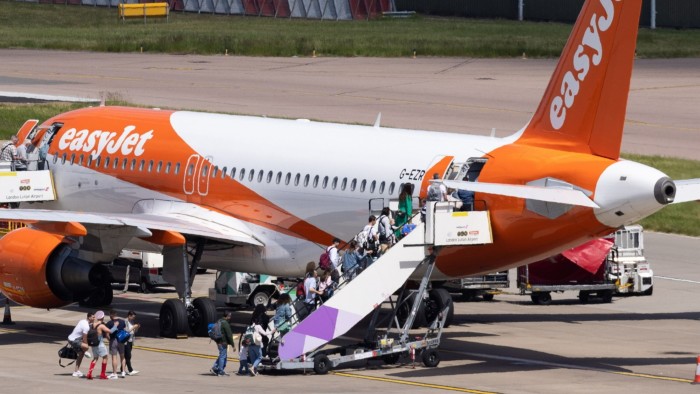Unlock the Editor’s Digest for free
Roula Khalaf, Editor of the FT, selects her favourite stories in this weekly newsletter.
EasyJet said it had halved its losses at the start of the winter season, as the low-cost airline was boosted by lower fuel costs and more people travelling over the Christmas period.
The FTSE 100 group on Wednesday reported a pre-tax loss of £61mn for the three months to December, down from £126mn in the same period a year earlier.
EasyJet forecast that losses for the whole winter would fall, adding that there had been “strong” demand for travel over Easter.
Shares in the airline fell 5 per cent in early trading on Wednesday before mounting a partial recovery to trade 2.8 per cent lower later in the morning.
Despite the loss, easyJet said it was on course to report pre-tax profits of £709mn for its current financial year, which runs to September, in line with market consensus compiled by the company.
The quieter winter season is often lossmaking for airlines, which have high fixed costs and typically charge lower fares to fill their aircraft during the off-season.
New chief executive Kenton Jarvis said the airline had made “positive progress” towards its medium-term target of annual pre-tax profits of £1bn.
EasyJet is the first major European airline to update on trading this year. The industry has so far appeared largely immune to the wider economic gloom in the UK, and executives believe consumers are prioritising spending on travel and holidays. But investors have been closely watching for any signs of cracks in demand, or of airlines charging lower fares for the months ahead.
“We have seen continuing demand for easyJet’s flights and holidays . . . with firm favourites like Palma, Faro and Alicante as well as new destinations like Tunisia and Cairo proving popular,” Jarvis said.
Passenger numbers in the three months to the end of December increased to 21.2mn from 19.8mn a year earlier, as easyJet took delivery of six new Airbus short-haul aircraft.
Revenue per seat — a proxy for ticket prices that includes extras such as baggage — rose 6 per cent to £74.36. Fuel costs fell 3 per cent in the quarter to £500mn.
EasyJet said revenue trends in the current quarter had been “modestly lower” than in the three months to December, which it blamed on investments in new and longer leisure routes that can take time to mature in popularity.










